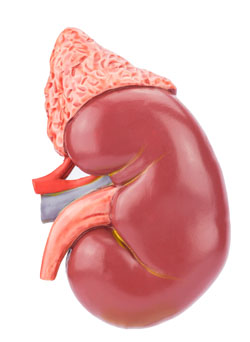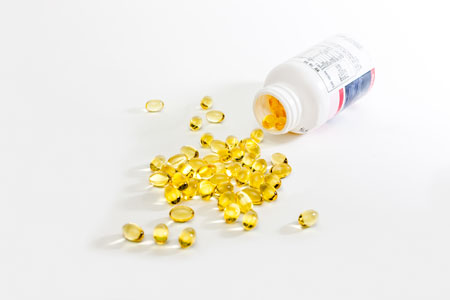Long-Term Lithium Treatment Has Risks for Kidney Function, Even with Precautions
 Long-term lithium use has long been associated with decreased renal function. But some Swedish researchers noticed that most long-term studies of patients with renal failure had begun in the 1960s and 1970s. In the 1980s, when it became clear that lithium could reduce renal function, doctors began to institute new safety measures for lithium users, including monitoring of blood levels of the drug and of creatinine, a substance that is excreted by the kidneys as part of normal muscle metabolism. So the researchers undertook a new study to examine whether the protocols instituted in the 1980s had reduced the renal risks of long-term lithium use. Unfortunately, they found that some reduced renal function is still common among people who use lithium for longer than 10 years, and this risk does not necessarily decrease when patients stop taking lithium.
Long-term lithium use has long been associated with decreased renal function. But some Swedish researchers noticed that most long-term studies of patients with renal failure had begun in the 1960s and 1970s. In the 1980s, when it became clear that lithium could reduce renal function, doctors began to institute new safety measures for lithium users, including monitoring of blood levels of the drug and of creatinine, a substance that is excreted by the kidneys as part of normal muscle metabolism. So the researchers undertook a new study to examine whether the protocols instituted in the 1980s had reduced the renal risks of long-term lithium use. Unfortunately, they found that some reduced renal function is still common among people who use lithium for longer than 10 years, and this risk does not necessarily decrease when patients stop taking lithium.
The researchers, led by Harald Aiff, published the study in the Journal of Psychopharmacology in 2015. They identified 4,879 patients who had been prescribed lithium, and narrowed this list down to 630 adult patients who had taken lithium for at least 10 cumulative years, who had normal levels of creatinine when they began taking lithium, and on whom good data existed. About one-third of these patients had evidence of chronic renal impairment, and in 5% of these the impairment was severe or very severe.
Aiff and colleagues’ findings show that lithium treatment requires careful monitoring, especially over the long term. Patients must consider the risk/benefit ratio of lithium treatment. Since prevention of mood episodes can preserve an average ten years of life expectancy, and lithium has the best data for efficacy in preventing manic and depressive episodes, patients must weigh the risks of insufficiently treated bipolar illness against the possibility for long-term decreases in kidney function.
Vitamin B6 May Reduce Restless Legs in Patients Taking Antipsychotics
The atypical antipsychotic lurasidone (Latuda) is one of only a few drugs effective at treating bipolar depression. But 5–10% of patients who take lurasidone experience akathisia, or restless legs.
At a recent meeting, psychiatrist Cynthia Turner-Graham told this editor (Robert Post) of her success in treating a patient with lurasidone-related akathisia that had been resistant to all the standard treatments, including dose reduction, anticholinergic drugs, benzodiazepines, beta-blockers, etc. Vitamin B6 at a dose of 600mg twice a day gave the patient complete relief.
Dr. Turner-Graham was kind enough to direct me to a small double-blind study supporting this clinical observation in patients with schizophrenia who experienced akathisia from treatment with antipsychotics. The study by V. Lerner and colleagues was published in the Journal of Clinical Psychiatry in 2004.
Cognitive Behavioral Therapy an Effective Follow-up to ECT
While electroconvulsive therapy (ECT) is very effective treating acute depression, especially among patients who have not responded to antidepressants, relapse rates following ECT are high. Researchers have been exploring treatments that may extend the effectiveness of ECT and reduce relapses, including antidepressant medication and continuation ECT. A new study by Eva-Lotta Brakemeier and colleagues in the journal Biological Psychiatry finds that cognitive-behavioral therapy combined with medication was most effective at sustaining response to ECT.
In the study, 60 patients who responded well to three-times-per-week right unilateral ultra-brief ECT then were prescribed antidepressant medication following current guidelines for ECT followup. Of these patients, one-third were randomly assigned to receive the medications only. Another third were randomly assigned to receive the medications and continuation ECT, and the final third were randomly assigned to receive medication and participate in 15 weeks of cognitive-behavioral therapy in a group setting. Each group was observed at six months, and then at one year. The group who received medication and cognitive behavioral therapy had significantly higher response rates than the other groups at both follow-up evaluations.
After the initial treatment with ECT, 70% of the patients had responded and 47% had achieved remission. Following the six months of continuation treatment, 77% of the group that received medication and cognitive behavioral therapy responded, while only 40% of the group receiving medication and continuation ECT responded, and 44% of those receiving medication alone responded. After one year (six months following the end of treatment), response rates were 65% for those who had received medication and therapy, 28% for those who had received medication and ECT, and 33% for those who had received medication alone.
Editor’s Note: These results are striking for several reasons. As has been found in most studies, continuation ECT is not very effective at sustaining remission. Cognitive behavioral therapy with medication beats the other options hands-down. These results are in accord with others that show that cognitive behavioral therapy also helps prevent relapses in patients who responded well to medications. The take-home message is that people who respond well to antidepressant medication or ECT would do well to add cognitive behavioral therapy to their other preventive treatments.
The current study did not replicate parameters for continuation ECT that were successful in a study by Axel Nordenskjöld and colleagues in the Journal of ECT in 2013. Nordenskjöld used weekly ECT for six weeks and every two weeks thereafter, for a total of 29 ECT treatments in one year, and found this more intense regimen was more effective at preventing relapse than medication alone.
Bipolar Disorder Is Often Overlooked in Primary Care
A 2014 study by Joseph M. Cerimele and colleagues in the journal Psychiatric Services found that primary care patients with bipolar disorder had severe depression and anxiety, symptoms of other psychiatric illnesses, and psychosocial problems such as housing difficulties, homelessness, or lack of support. Only 26% were referred to specialty mental health care despite the severity of these problems. These findings suggest the primary care setting, where many patients obtain their care, provides insufficient support for people with bipolar disorder.
Editor’s Note: There are several way to overcome the deficient recognition and treatment of bipolar disorder in primary care:
Record mood fluctuations
It is critical that patients keep a detailed longitudinal record of mood fluctuations in order to enhance the likelihood that their doctor can perform a well-informed evaluation and assessment of the effects of treatment. Several ways of doing this are available. We offer a variety of printable daily mood charts available on our website. Another option is What’s My M3, a free app that can be downloaded from the Itunes Store or Google Play. In a three-minute survey, it screens for depression, anxiety, OCD, PTSD, and mania. The ratings can be done longitudinally and printed out to assist a physician in the evaluation, assessment of course of symptoms, and response to treatment.
Parents of children aged 2–12 with mood or behavioral problems (or at risk for them because they have a parent with a diagnosis of depression or bipolar disorder) can rate their children each week as part of a new study. These ratings, which will help determine how children with symptoms of mental illness are being treated in the community, are done via a secure website and can be printed out to help a treating physician or other clinician to evaluate the children’s course of illness and responses to treatments. Access to informed consent documents and more information about participation in the study, known as the Child Network, is available here.
Learn about mood disorders
Patients should educate themselves about the signs and symptoms of mood disorders. Many books on this topic are available, and the BNN newsletter tries to update patients and clinicians about the latest findings about the treatment of depression and bipolar disorder.
Get extra help
Patients can seek out consultations with experts in bipolar disorder, who may be able to provide extra guidance to help primary care physicians arrive at the appropriate diagnosis or find an optimal treatment plan and back up approaches if the initial options do not bring about remission.
Finding a psychotherapist who can provide psychoeducation about bipolar disorder and cognitive behavioral or other specialized therapies may also be of great use, as more than a dozen randomized studies document the effectiveness of psychoeducation and/or psychotherapy compared to treatment as usual.
Talk about mood at every medical evaluation
Many medical problems such as heart disease and diabetes require careful monitoring, with patients as active participants. Likewise, careful monitoring of mood is a critical component of good treatment and should yield positive short-term and long-term results in recurrent depression and bipolar disorder.
Since depression can complicate many medical illnesses, patients should get in the habit of asking physicians not only about their blood sugar, blood pressure, or cholesterol, but also, “What about my low mood, anxiety, or insomnia?” It may be just the spark a physician needs to better attend to these equally important health issues.
People with High Inflammation Respond Best to EPA Omega-3 Fatty Acids in Depression
Omega-3 fatty acids are found in some green vegetables, vegetable oils, and fatty fish. There is some evidence that omega-3 fatty acid supplements can reduce depression, but researchers are trying to clarify which omega-3s are most helpful, and for whom. A new study in Molecular Psychiatry suggests that depressed people with higher inflammation may respond best to EPA omega-3 fatty acids compared to DHA omega-3 fatty acids or placebo. Researchers led by M.H. Rapaport divided people with major depressive disorder into “high” and “low” inflammation groups based on their levels of the inflammatory markers IL-1ra, IL-6, high-sensitivity C-reactive protein, leptin, and adiponectin. Participants were randomized to receive eight weeks of treatment with EPA omega-3 supplements (1060mg/day), DHA omega-3 supplements (900mg/day), or placebo.
While overall treatment differences among the three groups as a whole were negligible, the high inflammation group improved more on EPA than on placebo or DHA, and more on placebo than on DHA. The authors suggest that EPA supplementation may help relieve symptoms of depression in people whose depression is associated with high inflammation levels, a link common among obese people with depression.
Editor’s Note: These data add to a study by Rudolph Uher et al. in which people with high levels of C-reactive protein responded better to the tricyclic antidepressant nortriptylene, while those with low levels of the inflammatory marker responded better to the selective serotonin reuptake inhibitor antidepressant escitalopram.
Omega-3 Fatty Acids Improve Attention in Boys
A new study finds that omega-3 fatty acid supplementation improves attention in boys both with and without attention deficit hyperactivity disorder (ADHD). The study by Dienke J. Bos and colleagues in the journal Neuropsychopharmacology included 40 boys (aged 8–14) with ADHD and 39 demographically matched controls. Participants were given 10 g per day of margarine supplemented with either omega-3 fatty acids (eicosapentaenoic acid (EPA) and docosahexaenoic acid (DHA)) or placebo.
The children who received EPA/DHA supplementation showed improvements in attention (as rated by parents) compared to those who received placebo. Improvement was greater in the children with ADHD. Supplementation did not affect cognitive control or brain activity on functional magnetic resonance imaging (fMRI). Those boys who received omega-3s showed higher DHA levels on followup.
Mother’s Treatment for Depression Can Affect Children’s Symptoms
Studies have found that when a depressed mother’s symptoms remit, her children are less likely to show psychiatric symptoms. A new study by Myrna M. Weissman and colleagues in the American Journal of Psychiatry randomized 76 mothers to treatment with escitalopram, bupropion, or a combination of the two, and assessed the impact of the mothers’ treatment on their 135 children (aged 7–17).
There were no significant differences in the mothers’ symptoms or remission, but children’s depressive symptoms and functioning improved more if their mothers received (only) escitalopram. Only in that group was a mother’s improvement associated with her children’s improvement.
Mothers in the escitalopram group reported greater improvement in their ability to listen and talk to their children compared to the mothers in other groups, and the children of the mothers in the escitalopram group reported that their mothers were more caring.
Children of mothers with low negative affect improved significantly, while children of mothers with high negative affect only improved if their mothers were in the escitalopram group.
The authors suggest that for a mother’s improvement to help her children’s symptoms, her anxious distress and irritability must be reduced, and these may be better targeted with escitalopram than bupropion.
Family Intervention in Early Childhood Can Help Children Cope with Stress
Enduring stressful life events in childhood can affect children long-term. Children who experience neglect can show increased levels of cortisol, a stress hormone. Family interventions can reduce these levels, and a new study shows that the impact of these interventions can be lasting. The study, by Kristin Bernard and colleagues in the journal JAMA Pediatrics, included 115 children whose families had been referred to Child Protective Services after allegations of neglect. After an incident of neglect in early childhood, the families received either an experimental intervention called ABC (focused on increasing parental nurturance to child distress, increasing synchronous interactions, and decreasing frightening parental behavior) or a control intervention (which provided educational information about child development). When the children reached preschool age about three years later, the researchers collected the children’s cortisol levels at waking and bedtime on three different days.
The children whose families received the ABC intervention had more typical cortisol levels than those whose families had received the control intervention. The ABC children had higher morning cortisol, with a steeper decline throughout the day, compared to a more blunted cortisol rhythm in the control group children. These patterns resembled differences in the two groups observed three months after the initial intervention. The authors concluded that the ABC intervention has long-term effects on children’s physiological stress system, helping them maintain health and adjustment.
Collaborative Care and Education Reduces Bipolar Depression
There is increasing evidence that patients with bipolar disorder benefit from special programs or clinics designed to teach them skills to cope with their illness. A 2015 article by Trijntje Y.G. van der Voort and colleagues in the British Journal of Psychiatry evaluated the effectiveness of a Dutch program that provided collaborative care to people with bipolar disorder.
One hundred thirty-eight patients in an outpatient clinic were randomized to receive either treatment as usual or a program of nurse-provided collaborative care that included psychoeducation, problem-solving treatment, systematic relapse prevention contracts, and monitoring of outcomes. These services were managed by mental health nurses. Those patients who received collaborative care had significantly less time with depressive symptoms at the 6-month and 12-month marks, and less severe depressive symptoms at 12 months (all findings with p values less than .01).
There was no significant difference in manic symptoms or treatment adherence. The authors suggest that collaborative care improves treatment for people with bipolar disorder, especially depression, which is most closely linked to impaired quality of life and disability.
Editor’s Note: Given this study and about a dozen others like it, it is time to conclude that psychoeducation and other components of collaborative care noted here are critical to the long-term management of bipolar disorder. Patients and their family members should insist that this be a part of routine care.
Specialty Treatment for First Episodes of Psychosis Effective
A study published online in the journal Psychiatric Services comparing a specialty clinic that provides medication, family education, cognitive-behavioral therapy (CBT), and case management to improve employment and educational outcomes with treatment as usual for people in a first episode of psychosis found that the specialty treatment was associated with fewer and shorter hospital stays and better vocational engagement during one year of follow-up.
Most participants were referred to the study from inpatient psychiatric units. Those randomly assigned to receive treatment as usual typically did so in outpatient treatment settings. Those randomly assigned to the specialty treatment group joined the Specialized Treatment Early in Psychosis (STEP) program at the Connecticut Mental Health Center, where they could choose from any of the available interventions.
Other studies have found that comprehensive intervention encompassing psychoeducation, family therapy and other services can reduce psychotic symptoms. The authors of this study, Vinod H. Srihari and colleagues, concluded that a US public-sector model of early intervention in psychotic illness could be both feasible and effective.
Editor’s Note: In the British Journal of Psychiatry in 2013, Kessing et al. demonstrated even more dramatic and persistent benefits (for at least 6 years) of 2 years of specialty clinic care versus treatment as usual for patients with a first hospitalization for mania (many of whom were also psychotic). Together these two articles indicate the extreme importance of getting off to a good start in the management of major psychiatric illness. Such specialty programs are desperately needed for better management of childhood-onset mania.










